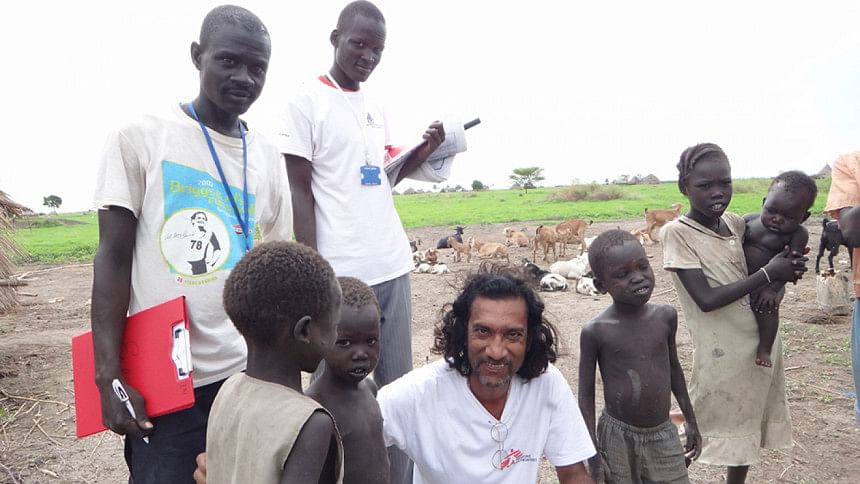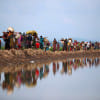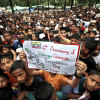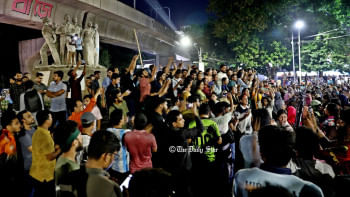Bangladeshi Without Borders

Meet Iqbal Huda, known as "Tidal", who has spent his entire life helping people in distress access free, need-based medical care.
"It was 1992. I was getting out of my mama's house in Cox's Bazar and I saw Bangladeshis as well as foreigners busy at work," described Tidal. "Curious, I walked over. An organisation called Médecins Sans Frontières (MSF), also called Doctors Without Borders, was setting up an emergency medical humanitarian project for Rohingya refugees who had just crossed from Myanmar. I had seen Rohingya refugees before in 1978 when I was a school kid. We were even called from school one day to help them. I knew we had to do whatever we could for the refugees in 1992 too. When I met the MSF Country Director I was very happy that an organisation was present to support them. After a brief talk I volunteered immediately." That's when Tidal first joined MSF.
As volunteers, members of MSF understand the risks and dangers of the missions they carry out, but they make no claim for themselves. They do so out of compassion, out of the desire to simply hand others a baton for the possibility of life. Tidal says he worked for MSF under no fixed designation the first four years of his career, "and they never let me leave, and here I am."
Twenty-seven years later, Tidal was leading a medical project in Chechnya till just a few weeks ago, where drug-resistant Tuberculosis (TB) is a life-threatening issue as a result of years of poor diagnosis and interrupted treatment. With almost 100 MSF staff, the project Tidal runs is now focusing on the extensively drug-resistant (XDR-form of the disease after handing the management of multi-drug resistant (MDR) TB patients over to the Ministry of Health in 2015. The project also supports the laboratory, health promotion and offers psychosocial assistance for TB patients and their families. We also conduct research activities," he explained. "In fact, the drug we are using now for XDR-TB patient is a new drug recently approved by the World Health Organisation,"
MSF is a Nobel Prize-winning private international association made up mainly of doctors and health sector workers providing assistance to populations of distress—whether they are victims of natural or man-made disasters or victims of armed conflict. "As members, we undertake to respect our professional code of ethics and maintain complete independence from all political, economic, or religious powers," Tidal explicated. "This is financially as well – 90% of all MSF's money comes from private donors, not governments."
Tidal has been out coordinating MSF projects since 2003. He has worked in several contexts, even braving the risks involved in working in conflict zones. "Just a few years back we had to completely pull out of Chechnya," he said, "But we worked hard and are back again now. There is a need, and there are Chechen doctors and nurses bravely struggling to heal people, who benefit from our support."
So what is it like to work in the field? "It's not for everyone," he chuckled. "I have worked in places like Somalia, tribal areas in Pakistan, Afghanistan and South Sudan. Each had different challenges." MSF's projects range from emergency response, medical research projects treatment of neglected diseases like Kala Azar and long-term conditions like TB and HIV/AIDS.
Last month Tidal came back to his country to visit his family and to revisit Cox's Bazar, where it all started on the eve of the 1978 FIFA World Cup. Tidal is scheduled to join yet another MSF project in October—this time in Iraq.
MSF is made up of doctors and health professionals from all over the world who provide assistance to people irrespective of their race, religion, creed, gender or political convictions. It was founded in 1971 and works in more than 70 countries around the world today , that delivers emergency aid to people affected by armed conflict, epidemics, natural disasters and exclusion from healthcare.
MSF has been working in Bangladesh since 1992 and currently runs two projects. MSF's clinics in the slum areas of Kamrangirchar provide a range of services focusing on sexual and gender-based violence, adolescent reproductive health and occupational health for factory workers. MSF also runs a clinic in Kutupalong, Cox's Bazaar, providing health and maternal care to Rohingya refugees and the local Bangladeshi population.

 For all latest news, follow The Daily Star's Google News channel.
For all latest news, follow The Daily Star's Google News channel. 








Comments